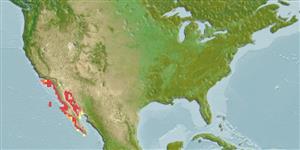Environment: milieu / climate zone / depth range / distribution range
पारिस्थितिकी
समुद्री ड़िमरसल; गहराई सीमा ? - 46 m (Ref. 2850), usually 3 - 15 m (Ref. 2850). Subtropical; 34°N - 20°N, 121°W - 109°W
Eastern Pacific: California, USA to Baja California, Mexico.
Length at first maturity / आकार / वज़न / Age
Maturity: Lm ?, range 27 - ? cm
Max length : 45.0 cm TL पुल्लिंग / अलिंग; (Ref. 9118); common length : 30.0 cm TL पुल्लिंग / अलिंग; (Ref. 9118); अधिकतम प्रकाशित वज़न: 700.00 g (Ref. 2850); अधिकतम सूचित उम्र: 20 वर्षो (Ref. 72462)
Common species found near the bottom, often in caves and crevices of exposed coasts and open bays (Ref. 9118). Feeds on crabs (Ref. 9118).
Eschmeyer, W.N., E.S. Herald and H. Hammann, 1983. A field guide to Pacific coast fishes of North America. Boston (MA, USA): Houghton Mifflin Company. xii+336 p. (Ref. 2850)
IUCN Red List Status (Ref. 130435)
Threat to humans
Harmless
Human uses
साधन
Special reports
Download XML
इंटरनेट स्रोत
Estimates based on models
Preferred temperature (Ref.
123201): 16.7 - 24.2, mean 22.3 °C (based on 110 cells).
Phylogenetic diversity index (Ref.
82804): PD
50 = 0.7500 [Uniqueness, from 0.5 = low to 2.0 = high].
Bayesian length-weight: a=0.00933 (0.00538 - 0.01619), b=3.09 (2.94 - 3.24), in cm total length, based on LWR estimates for this species & (Sub)family-body (Ref.
93245).
Trophic level (Ref.
69278): 3.6 ±0.60 se; based on food items.
Generation time: 6.0 ( na - na) years. Estimated as median ln(3)/K based on 1
growth studies.
लौटाव (Ref.
120179): माध्यम, न्यूनतम जनसंख्या दुगनी होने का समय 1.4 - 4.4 वर्ष। (K=0.18).
Fishing Vulnerability (Ref.
59153): Moderate to high vulnerability (49 of 100).
